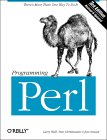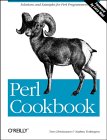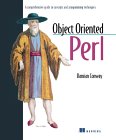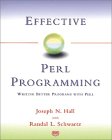Essential Perl Bookshelf |
|||

Programming Perl (3rd Edition) |

Perl Cookbook |

Object Oriented Perl |

Effective Perl Programming: Writing... |
To intall new modules on Unix.....
perl -MCPAN -e shell
install Bundle::CPAN
To install new modules on Windows/ActiveState Perl run 'ppm' (Perl Package Manager) from the command prompt.
Perl has great documentation bundled with it.
To access the documentation, use the program 'perldoc'
Example,
Help on a module: perldoc CGI
Help on a built-in function: perldoc -f split
Display the Perl FAQ perldoc perlfaq
Display the Perl FAQ Page 4 perldoc perlfaq4
Search the Perl FAQ perldoc -q input
From perldoc -q
How can I pull out lines between two patterns that are
themselves on different lines?
You can use Perl's somewhat exotic `..' operator
(documented in the perlop manpage):
perl -ne 'print if /START/ .. /END/' file1 file2 ...
If you wanted text and not lines, you would use
perl -0777 -ne 'print "$1\n" while /START(.*?)END/gs' file1 file2 ...
But if you want nested occurrences of `START' through
`END', you'll run up against the problem described in the
question in this section on matching balanced text.
Here's another example of using `..':
while (><) {
$in_header = 1 .. /^$/;
$in_body = /^$/ .. eof();
# now choose between them
} continue {
reset if eof(); # fix $.
}
| A regular (scalar) variable | $a = 5; $xyz="1234"; |
| An (regular) array | @a = ( 123, "abc", 456 ); |
| The second element of the array ( a scalar, indexes start at 0 ) | $a[1]; |
| Accessing all elements of an array | foreach $item ( @a ) { print "$item\n" } |
| A hash array. Why do we have to index items by a number? Can't we do it with a string instead? Thats what a hash is for! |
%myHash = ( bananas => "yellow", apples => "red", ); |
| Accessing an item in the hash | print "The color of bananas is: ", |
| Accessing all elements of an hash | foreach $fruit ( keys %myHash ) { print "$fruit is the color $myHash{'$fruit'}\n" } |
| REFERENCES ( a.k.a. Pointers ) Note:All references are scalar variables. |
|
| A reference to a scalar variable. | $aRef = \$a; |
| Printing a reference to a scalar. The {} are optional. |
print "${$a}\n"; |
| A reference to an array | $aRef = \@a; |
| De-Referencing the entire array. | @aCopy = @{$aRef}; |
| Printing an element from a reference to an array. | print "$aRef->[1]\n"; |
| Creating a reference to an array. Note the change from our previous example. @a is now $a and the ('s are changed to ['s |
$a = [ 123, "abc", 456 ]; |
| Accessing all elements from an referece to an array | foreach $item ( @{$a} ) { print "$item\n" } |
| A reference to a hash | $myRef = \%myHash; |
| Accessing all elements of an hash via a reference. | foreach $fruit ( keys %{$myRef} ) { print "$fruit is the color $myRef->{'$fruit'}\n" } |
| A hash array reference. Note the change from our previous example. %myHash is now $myRef and the ('s are changed to {'s |
$myRef = { bananas => "yellow", apples => "red", }; |
$grammar = <<'EOG';
{ our $quoted = Text::Balanced::gen_delimited_pat(q{"'}); }
report:
assignment(s)
assignment:
tagged | complex | simple |
simple:
keyword value
complex:
keyword '{' assignment(s) '}'
tagged:
keyword tagname '{' assignment(s) '}'
keyword:
/[^\s"'`]+/ # or maybe an explicit list of alternatives
tagname:
/[^\s"'`]+/ # or whatever your tagname rules are
value:
/$quoted|[^\s{}]+/
EOG